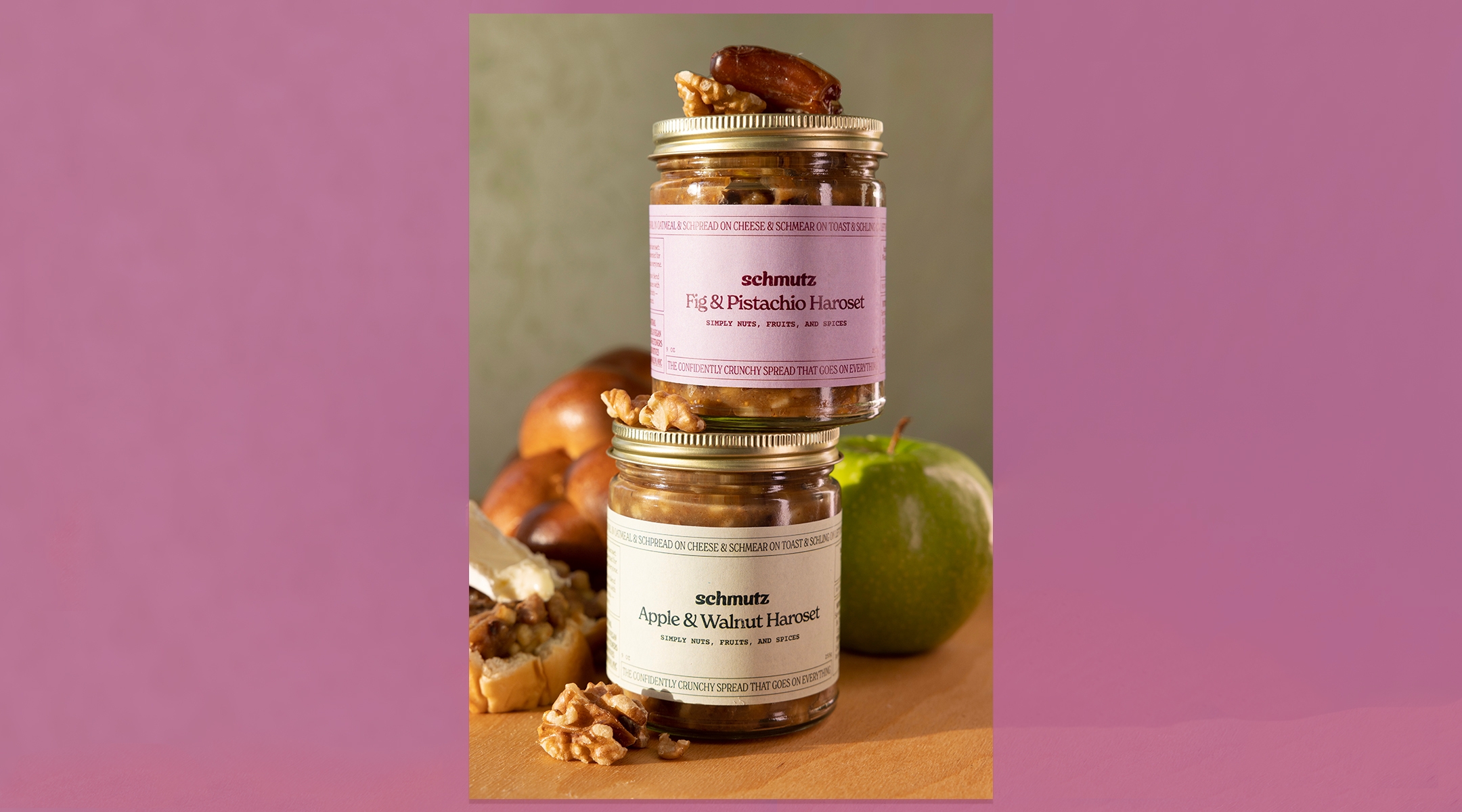(New York Jewish Week) — For many, the highlight of the Passover seder is haroset — the nutty, fruity, sweet and crunchy paste spread on matzah and meant to symbolize the mortar slung by enslaved Israelites.
Such was the case for Michael Rubel. His mother’s haroset — made with “chopped apples, Manischewitz, raisins and lots of cinnamon,” as he describes it — was something he looked forward to all year. It was delicious, rare and one of the few distinctly uncommon Jewish foods he remembered from growing up in Kansas City, Kansas.
In fact, Rubel, 26, wondered why such a treat would be confined to Passover. “I can’t tell you how many Jews have said to me, ‘Yes, I’ve always asked why we only eat this once a year,’” Rubel told the New York Jewish Week. “It feels almost universal.”
So the Bed-Stuy, Brooklyn resident, decided to do something about this sad state of affairs: Last week he launched the food brand Schmutz, which makes a haroset that is meant to be eaten all year round.
Rubel launched his brand online and at a party at East Williamburg’s Tchotchke Gallery on April 1. Within 48 hours, that first drop — which consisted of a traditional Ashkenazi apple and walnut haroset, as well as a fig and pistachio haroset inspired by a 15th-century Italian recipe — sold out. According to Schmutz’s Instagram, they sold 249 pounds of the stuff, or around 500 jars.
Schmutz haroset is not kosher for Passover; as for the brand’s name, which means “dirt or unpleasant substance” in Yiddish, Rubel says it is meant to be ironic — haroset may be delicious but it “is not a pretty food,” he concedes.

Michael Rubel, 26, mingles with guests who came to the “Schmutz” launch event at Tchotchke Gallery on April 1, 2023. (Jeffrey Rubel)
The nine-ounce jars retail for $18, which Rubel acknowledges is expensive. “It’s small-batch crafted and definitely a specialty product,” he said, “but I’m excited to make this product even more accessible going forward.”
Rubel believes that haroset can evolve into something like a jam or a condiment, a shelf-stable food that’s readily available in restaurants, synagogue gift shops and specialty food stores. The opportunities are endless — as the brand’s website says, “schwirl it in oatmeal and schpread it on cheese and schmear it on toast and schlep it to a picnic and schling it on leftovers and schpoon it from a jar.”
Though Rubel works a day job in product development at a software startup, he had previously worked in restaurant kitchens and in product development for a snack company. This, he said, gave him insight into both the production side and the business side of developing a new snack food.
Then again, haroset is more than a delicious snack or topping, according to Rubel: It also epitomizes the Jewish food experience, providing a unique opportunity to highlight the diversity of Jewish cultures. Each unique haroset recipe, he said, serves as a window into different Jewish experiences all around the world.
“One Passover during Covid, I fell down a rabbit hole of global haroset recipes, and fell so deeply in love with this food as a prism into the diaspora. It’s emblematic of a central Jewish tradition; we carry some shared instructions around the world and do different things with it,” he told the New York Jewish Week. “You’ve got a history of French folks making haroset with chestnuts, Italian communities using pine nuts. There’s tropical cherries in Suriname; dates in places like Iraq and India; peanuts, bananas, rose petals, pear and more elsewhere. Even within those communities, you see it done very differently, with different tastes, textures and beyond.”

So far, Rubel has created two flavors of the jarred haroset — fig and pistachio and apple and walnut. He hopes to include more in the future. (Landon Cooper)
Rubel wants Schmutz haroset to be part of the movement exposing Jews and non-Jews to the diversity of Jewish food. Though the first drop consisted of just two varieties, he promises more are around the corner for later this spring. “I love Ashkenazi foods so deeply, and yet, Jewish food is more than that,” Rubel said. “It feels especially important in this moment, when Jews are getting a lot of public attention, to share the depth of global Jewish cuisine, and to show that there’s no one type of Jew.”
Liz Alpern, a co-owner of Gefilteria — a brand, launched in 2012, that took another Passover staple, gefilte fish, mainstream — told the New York Jewish Week via email that she is “excited about Schmutz because it’s offering the wider world the opportunity to enjoy one of the most beloved foods from the Jewish canon.”
“Michael is thoughtful and knowledgeable about the countless global variations on charoset and he’s introduced me to many flavors I hadn’t heard of before,” Alpern added. (Gefilteria helped sponsor and cater Schmutz’s launch party last weekend.)
Having lived in New York for four years now, Rubel said he is realizing just how much Jewish food is available here — and how little is available elsewhere. That’s something he aspires to change. “I’m excited to bring a new Jewish energy not just to the kosher aisle but beyond it,” he said.
The New York Jewish Week brings you the stories behind the headlines, keeping you connected to Jewish life in New York. Help sustain the reporting you trust by donating today.





